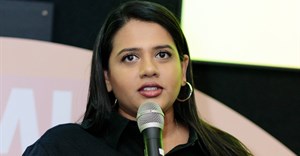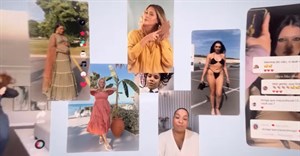Trending
#NedbankIMC2023: From creator economy to cosy web to a new spirit of reciprocity and generosity

Before founding her company Bodacious, Scaman was global head of strategy for film director Ridley Scott, a position that saw her deep diving and falling in love with the future of entertainment and the concepts of gaming engines, AI, immersive worlds, community and fandom.
UGC phases
- UGC Phase 1
Scaman says the first iteration of the internet was predominantly text-based… we remember the advent of bloggers, forums, fan fiction and Dungeons & Dragons-type gaming rooms creating pedestals for new voices and ideas and lots of new information sources, which the newly founded Google allowed us to find.
- UGC Phase 2
Over the last 20 years or so platforms such as Issuu, Instagram, TikTok and YouTube have birthed new entertainment formats and new creator economies, it is in this Web 2.0 space that foundations and followers of influencer culture have emerged.
- UGC Phase 3This is where the internet is moving now, with accelerators of 3D creation such as Roblox, generative AI, Unreal Editor for Fortnite (UEFN), Web 3.0 and others. These are giving rise to greater democratisation and decentralisation for creators - whereby anyone can create, on their own, without having to wait for a film studio or a game designer. This is the exciting new democracy of shared ownership and reciprocal value flows, and points to new definitions of what brands can be, how they act and how to embrace and evolve in the world.
The creator economy
This new creator economy has been born out of influencer culture and fast-tracked due to Covid, when musicians, actors, fashion designers etc. needed to find new ways to reach audiences and generate income. Platforms like Patreon and Discord and new monetisation models such as virtual tipping on Facebook were born.
The creator economy, says Scaman, has given rise to smaller pockets of community, with shared passion and beliefs around the particular creator, also becoming known as the cosy web.
The cosy web
Scaman talks about the term coined by Venkatesh Rao, inspired by a theory from Kickstarter founder Yancey Strickler, describing the safe spaces of the internet, spaces where the bots and algorithms have not yet infiltrated. Messaging apps, private groups, storage services such as Dropbox and email fall into the cosy web.
Scaman points out we have got to the point where we have to admit that big social is not healthy for us anymore and is on the decline. Platforms such as Twitter have caused us to be more divisive than ever, all screaming at each other, and the experiment of the global town hall has not worked.
Enter the cosy web, the space where smaller cohorts and closed ecosystems of like-minded pockets of people with shared interests form the basis of new communities.
The rise of community economies
Web Phase 3, she says is becoming a place of collective wisdom, collective efforts, a sense of belonging, a place where we want to make stuff together, build together, evolve together, where the ability to have peer-to-peer interactions is generating new business models, strategies and community economy.
AI, democratisation and ownership
What AI is doing, she says, is turbo-charging the democratisation of creativity, via platforms such as Discord, MidJourney, Unreal Engine etc. that allow the means for people to come together to form communities and to create.
Reciprocal value flow
Brands and advertising agencies are super scared that generative AI will take over their jobs, says Scaman, but these new technologies are also inspiring new thinking - about how brands can unlock reciprocal value flow from fans, users, makers and co-creators.
From passive to participative, ownership to belonging, fixed products and brands to iterative, and most importantly from closed components to open components, these are strategic opportunities for brands to evolve. Any concepts that can be used to add and to build, to empower and to collaborate on new possibilities, are in the right direction - the articulation of the title of Scaman’s Multiplayer Brand.
Research done with the Walton Family Foundation into Gen Alpha, the successors to Gen Z, denotes that for this up-and-coming Gen, the future of education is the act of creation and play with engines such as Minecraft, Roblox, Lego leading as the biggest players in the field.
The new spirit of reciprocity and generosity
- Nike.Swoosh
Nike’s acquisition of RTFKT and the 2022 birth of .Swoosh, allows Nike creators and fans to participate in the creation of virtual Nike products for use in video games or other immersive experiences, to trade and co-create virtual Nike products and tokens in a community economy, whereby if the creator’s products are sold they even get to keep the cash.
- Grimes
Another example of this new spirit of reciprocity and generosity, is the artist Grimes, who has embraced the trend of fans using AI to create songs with famous singers’ voices, bringing her fans into the fold with an open invitation to remix or use her voice via Elf.tech, dedicated open-source software allowing them to replicate her voice and even share in the royalties.
- GoogleXReciprocity in action is seen from GoogleX and Universal Music, pre-empting deep fakes of tracks by Drake, Kanye and other artists, to open them up to co-creator fans with kickbacks to the artists who inspired them.
The age of the multiplayer brand is upon us, people want to cooperate, co-create and participate and according to Scaman’s research insights we will be seeing more and more shifts to the new open source, open share platforms of empowerment, communities, business and shared investment models.























